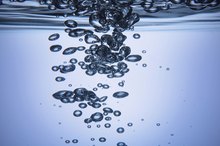What Are the Benefits of Well Water?
Whether you buy it at the store or get it straight from the tap, water's always your healthiest drink option. The U.S. Environmental Protection Agency reports that because it does not test well water, it does not know what's in it, so despite the benefits of water, drinking it from a well carries some risk.
Well Water Nutrition
Despite the EPA's reports of limited ability to gather information on well water, the U.S. Department of Agriculture's food nutrient database provides average well water nutrition information. A 1-cup serving of well water from the tap is calorie-free and contains 7 milligrams of calcium, 2 milligrams of magnesium and 12 milligrams of sodium. The same serving of municipal tap water has the same amount of calcium and magnesium, but less sodium, with 7 milligrams per cup. The mineral content in your well water may differ.
Health Concerns
The Best Refrigerator Water Filters
Learn More
If your well is too close to the surface, you risk drinking water that may be contaminated with microorganisms, warns the EPA. Also, depending on the area, the groundwater may contain high levels of radon, nitrites, nitrates or heavy metals such as cadmium, arsenic or lead. There's also risk of human contaminants in your well water such as pesticides, fertilizers or industrial waste. Have your water tested regularly to reduce risk of illness.
Related Articles
References
Writer Bio
Jill Corleone is a registered dietitian and health coach who has been writing and lecturing on diet and health for more than 15 years. Her work has been featured on the Huffington Post, Diabetes Self-Management and in the book "Noninvasive Mechanical Ventilation," edited by John R. Bach, M.D. Corleone holds a Bachelor of Science in nutrition.









